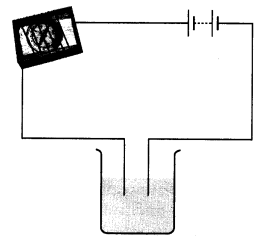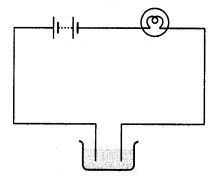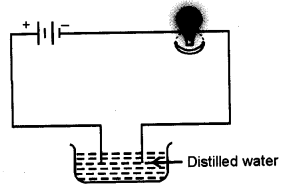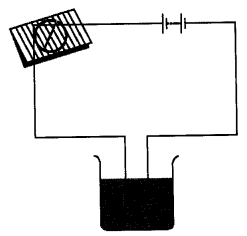Question 1.
Fill in the blanks.
(a) Most liquids that conduct electricity are solutions of ______ , ______ and ______
(b) The passage of an electric current through a solution causes _______ effects.
(c) If you pass current through copper sulphate solution, copper gets deposited on the plate connected to the ________ terminal of the battery.
(d) The process of depositing a layer of any desired metal on another material by means of electricity is called _______
(a) acids, bases, salts
(b) chemical
(c) negative
(d) electroplating
Question 2.
When the free ends of a tester are dipped into a solution, the magnetic needle shows deflection. Can you explain the reason?
The deflection in magnetic needle shows that the circuit is complete and the solution conducts electricity, i.e., it is a good conductor.
Question 3.
Name three liquids, which when tested in the manner shown in Fig. 14.5. may cause the magnetic needle to deflect.

Vinegar, lemon juice, and tap water.
Question 4.
The bulb does not glow in the setup shown in Fig. 14.6. List the possible reasons. Explain your

The bulb may not glow because of the following reasons:
(i) The wires in the circuit may be loosely connected.
(ii) The bulb may be fused.
(iii) The cells may be used up.
(iv) The liquid may be an insulator, i.e., a poor conductor of electricity.
Question 5.
A tester is used to check the conduction of electricity through two liquids, labelled A and B. It is found that the bulb of the tester glows brightly for liquid A while it glows very dimly for liquid B. You would conclude that
(i) liquid A is a better conductor than liquid B.
(ii) liquid B is a better conductor than liquid A.
(iii) both liquids are equally conducting.
(iv) conducting properties of liquid cannot be compared in this manner.
(i) liquid A is a better conductor than liquid B.
Question 6.
Does pure water conduct electricity? If not, what can we do to make it conducting?
No, pure water doesn’t conduct electricity. But when salt is dissolved in pure water, it conducts electricity.
Question 7.
In case of a fire, before the firemen use the water hoses, they shut off the main electrical supply for the area. Explain why they do this.
The water used in the water hoses is not pure water and is a good conductor of electricity. So, the fire¬men shut off the electric supply before spraying water to save themselves and other people from electrocution.
Question 8.
A child staying in a coastal region test the drinking water and also the seawater with his tester. He finds that the compass needle deflects more in the case of seawater. Can you ex¬plain the reason?
The seawater contains a huge amount of salts in comparison to drinking water, hence the seawater is a better conductor of electricity and it produces a stronger magnetic field in the wire and hence deflects the compass needle more.
Question 9.
Is it safe for the electrician to carry out electrical repairs outdoors during heavy downpour? Explain.
No, it is highly dangerous to carry out the electrical repairs outdoors during the heavy downpour. It can cause electrocution, as water is a good conductor of electricity.
Question 10.
Paheli had heard that rainwater is as good as distilled water. So she collected some rainwater in a clean glass tumbler and tested it using a tester. To her surprise, she found that the compass needle showed deflection. What could be the reasons?
Rainwater is pure water which is an insulator but it gets mixed with air pollutants like sulphur dioxide and nitrogen oxides and form acidic solution, which is a good conductor of electricity. So, the compass needle showed deflection.
Question 11.
Prepare a list of objects around you that are electroplated.
Objects that are electroplated are door handles, taps, rims of cycles, showers, the handlebar of cycles and bikes, gas burner, tin cans, metallic almirahs, buckles of belts, etc.
Question 12.
What are conductors ?
Materials which allow electric current to flow through them are called conductors.
Question 13.
What are insulators ?
Materials which do not allow electric current to flow through them are called insulators.
Question 14.
Classify the following liquids into conductors and insulators : lemon juice, , distilled water, tap water, milk.
Conductors : lemon juice, tap water.
Insulators : distilled water, milk.
Question 15.
What are electrodes ?
Electrodes are the terminals through which current is passed into a liquid.
Question 16.
Which is the most common application of chemical effect of current ?
Electroplating.
Question 17.
Apart from chemical effect, which other effect electric current produce ?
Electric current can produce magnetic effect also.
Question 18.
Is air an insulator or conductor of electricity ?
Air is an insulator of electricity.
Question 19.
Name one non-metal which a good conductor of electricity.
Graphite.
Question 20.
What is LED?
LED is Light Emitting Diode.
Question 21.
What is electrolysis ?
Electrolysis is the breaking up of a compound from its solution on passing electric current through the electrolyte.
Question 22
Name the gases formed when electric current is passed in water containing a few drops of acid ?
Hydrogen and Oxygen.
Question 23.
In what proportion the two products from electrolysis of water are obtained ?
By volume of hydrogen gas is twice the volume of oxygen gas.
Question 24.
What is CFL ?
Compact Fluorescent Lamps.
Question 25.
Jaya sets up a circuit as given below. But the bulb does not glow. Why?

The bulb does not glow because distilled water is an insulator, since it does not have dissolved salts.
Question 26.
When the free ends of a tester are dipped into a solution, the magnetic needle shows deflection. Can you explain the reason ?
Yes, the solution does conduct electricity. Compass needle shows deflection due to magnetic effect of electric current.
Question 27.
Name three liquids, which when tested in the manner shown in figure, may cause the magnetic needle to deflect.
The compass needle will show deflection with tap water, lemon juice and sodium chloride
Question 28.
A tester is used to check the conduction of electricity through two liquids, labelled A and B. It is found that the bulb of the tester glows brightly for liquid A while it glows very dimly for liquid B. You would conclude that
- Liquid A is a better conductor than liquid B.
- Liquid B is a better conductor than liquid A.
- Both liquids are equally conducting.
- Conducting properties of liquid cannot be compared in this manner.
Liquid A is a better conductor of electricity because the bulb glows more in it.
Question 29.
Does pure water conduct electricity ? If not, what can we do to make it conducting ?
As pure water is free of salts and thus it is an insulator so to make pure water conducting, we can add some salts or acid to it.
Question 30.
Deposits can be seen in containers uses for storing water. Explain why these deposits occur.
In containers, water evaporates slowly. The salts separate out and deposit on the sides of the container.
Question 31.
In case of a fire, before the firemen uses the water hoses, they shut off the main electrical supply for the area. Explain why they do this.
Firemen shuts off the main electrical supply for the area because water is a good conductor of electricity and the firemen can get electrocuted.
Question 32.
Is it safe for the electrician to carry out electrical repairs outdoors during heavy downpour? Explain.
No, it is not advisable for electrician to carry out electrical repairs during heavy downpour because water is a good conductor of electricity and the person can get shock.
Question 33.
A child staying in a coastal region tests the drinking water and also the seawater with his tester. He finds that the compass needle deflects more in the case of seawater. Can you explain the reason ?
The sea water contains more salts dissolved in it as compared to the tap water. So, the deflection of the compass needle is more.
Question 34.
Fill in the blanks.. [NCERT]
- Most liquids that conduct electricity are solutions of …………, ………. and …………..
- The passage of an electric current through a solution causes ……………….. effects.
- If you pass current through copper sulphate solution, copper gets deposited on the plate connected to the ……….. terminal of the battery.
- The process of depositing a layer of any desired metal on another material by means of electricity is called …………
- acids, bases and salts.
- change
- negative
- electroplating
Question 35.
Paheli had heard that rainwater is as good as distilled water. So she collected some rainwater in a clean glass tumbler aifd tested it using a tester. To her surprise she found that the compass needle showed deflection. What could be the reasons ?
The rainwater showed deflection with the tester because it is not as pure as distilled water. Distilled water does not have any salts dissolved in it, but rain water may have some impurities in it.
Question 36.
Why should you not touch electrical appliances with wet hands ?
Lorem ipsum dolor sit amet, consectetur adipiscing elit. Ut elit tellus, luctus nec ullamcorper mattis, pulvinar dapibus leo.
Question 37.
Why is chromium used for electroplating ? .
Chromium is used for electroplating because it has a shiny appearance, does not corrode and is scratch resistant.
Question 37.
Why the iron cans are electroplated with tin ?
Tin is less reactive than iron. Thus food, stored in iron cans, is prevented from being spoilt due to iron by electroplating it by tin.
Question 38.
Why should you not do the experiments on electricity by using electric supply from mains ?
We should not do the experiments on electricity by using electric supply from the mains because there is large amount of current and the person using it can get electrocuted.
Question 39.
If the ends of the wire of tester are touched for a long time, what will happen ?
If the ends of the wire of tester are touched for a long time, the cells will be finished very soon.
Question 40.
What is the disadvantage of electroplating done in the factories ?
The disposal of the used conducting solution after electroplating is hazardous and can cause environmental pollution. There are specific disposal guidelines for environmental protection.
Question 41.
How are bridges and automobiles prevented from rusting ?
Bridges and automobiles are prevented from rusting by plating them with zinc.
Question 42.
Why are LEDs more useful for testing the flow of electric current ?
LEDs require very little energy and glow even if a small current is passing through the circuit.
Question 43.
Give the construction of LED.
LED is a device in which the two terminals inside the glass bulb are connected together with a metallic point of Galluim Arsenide.
Question 44.
After the electroplating of a spoon with silver, it was found that the anode has become thin. Why ?
During electroplating, the silver metal from the anode is deposited on the cathode. Therefore, it becomes thin.
Question 45.
What is electroplating? Write its one use.
Electroplating is the process of depositing a thin film of one metal over another metal by passing electric current through an electrolyte. Use plating artificial jewellery with gold.